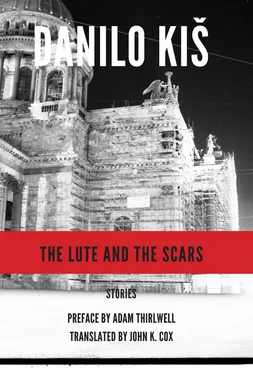And thus off they go, all bunched together, through the streets of the city that are in some places exposed to the sun (at which they pull their visors down over their eyes) and in other places through great polygons of shade, where tall buildings block the light. Office denizens take up positions on the sidewalks and applaud irresolutely; gentlemen brandish their canes, pointing out their favorites; the hairdressers abandon their lathered-up customers for a few minutes; and the apprentices, leaning on their doorposts, follow with a look of nostalgia in their eyes those lucky ones to whom fate has granted a freedom as good as wings, and to one of whom will belong the glorious status of victor.
They are still running in a pack, and through the thinning applause they can hear only the rhythmic scraping of their shoes and their own breathing. Then the city gradually falls behind them. They pass the smoke-filled slums, the paper mill, and the brewery; the train depot was on their left; now they have crossed the bridge; this is where the fields begin, and the meadows and the thickets of reeds from which the morning sun causes mist and the smell of grass to rise. This smell compels them to press their eyes shut as if the divine power of nature, the Antaeus-like juices of the earth, might thereby flow more easily into lungs and blood through their straining breath.
The route is marked off with flags, and the motorcycle, sputtering and meandering in front of them, prevents the runners from losing their way. Meanwhile, the compact mass of runners has broken up. Of course at first this is still just a test of their strength or whatever early (and temporary) crises they might experience before the bodies subordinate themselves to the power of will and reason and ambition; or until they give out completely.
Valdemar D., wearing #25, a tall fellow about thirty years of age, with close-cropped blond hair and long, lean legs, felt how he had finally shaken off his body’s lassitude, and by the time he reached the edge of the woods, he felt he had likewise overcome the sluggishness in his muscles, the indifference of his bones, the laziness of the soles of his feet — and at last overpowered this animal of a body that a saint had once named his donkey. He ran easily and his legs felt fresh, moving like well-oiled pistons. As if the forest smells and the redolent conifers had given him new strength. The sound of chainsaws, the hammering of axe-blows on sonorous tree trunks, the aroma of moist sawdust, reminiscent of urine — these were all distant echoes of his childhood.
Notwithstanding the agreement with his trainer, now faded and forgotten in his mind, he picked up the pace on a downhill stretch in the woods in what would have been a respectable end-of-race kick, and he worked his way up to the front of the group that was in the lead; the famous veteran was in this group, running as an honorary competitor in his valedictory race. For a moment it seemed to the marathon runner that the veteran was looking at him in bewilderment, and then the veteran shook his head as if to make it clear that this was not the way to do things. It was not yet time to go for the lead since they had just barely cleared the city: the tolling of the bells from the municipal bell tower could still clearly be heard.
When he came out into open country, Valdemar D. turned around. Behind him he saw the green barrier of the woods and the narrow path, empty of people. (He imagined the others on their way up the last incline deep in the heart of the forest, panting, and finding his footprints in the mud.)
He knew the lay of the land around here, knew it very well indeed; he’d had the good fortune of training on this same path along which he was now hurtling, propelled by the bracing wind and a sense of rapture that he had long ago forgotten.
At the six-kilometer mark they splashed a can of water on his face; at seven kilometers someone handed him a bottle and as he ran he drank the liquid that smelled of elderberry and tasted like rainwater; at ten kilometers somebody shouted that he should slow his pace and save his strength for the finish; in the eleventh kilometer he sank up to his ankles in the muck hard by a lake.
With the astonishment of someone skilled and well-trained — a seasoned runner who had started off with short distances until he found his real niche, aided by the advice of his coach, in long-distance events where the role of luck is reduced to the absolute minimum but will-power, experience, and preparation are decisive — he realized that he was running the race of his life, that he would win the trophy that hundreds or even thousands of athletes yearned for. Ecstatic at the fact that his body was obeying him without effort or opposition, he attained complete harmony with this corporeal instrument; having broken its resistance, having conquered and subjugated it, he reflected on the biological miracle that had enabled him to overwhelm the inertia of his body, the resistance of matter and gravity — and he thought about how he had succeeded, in the manner of an Indian fakir, to adjust the function of his heart, to control its rhythm. He wondered how this magical harmony, this ideal balancing act of will, strength, years, and days had come to be.
And now he turned around, but in vain. Behind him were nothing but gently rolling green hills, forested heights, and the red reflection of the lake; not a visual clue or a sound connected with the people in whose company he began this race.
The sun, passing along its high arc, was his only accompaniment.
The shiny cross on the village steeple grew ever nearer. From the slates leaning against trees along the route, he followed the passage of the kilometers until he finally discovered, not without amazement, that on one of them — propped up against a telegraph pole — was written the number twelve. A record time even for a five thousand-meter race, he thought, and his heart was filled with joy, a joy that frightened him a little, as if he were witnessing some wondrous and unknown phenomenon bordering on the superhuman, the impossible. For if he felt this fresh here, at the half-way point, then it was only some unexpected misfortune, an awkward fall or a wrenched ankle, that could prevent him from setting a fantastic record that would go down in the annals of sports. A triumph worthy of the Marathon myth.
On the edge of the next village, the motorcycle slowed down and pulled into a soccer field overgrown with grass and tall weeds. (The sound of the motor died out abruptly and he thought it must have broken down.) There he saw someone next to the decrepit goalposts beckoning with a little yellow flag. He turned around, thinking the signal wasn’t meant for him but rather for some boys who had been trailing him, or for some inquisitive cyclist who had gotten too close. But there was no one behind him. The motorcycle curved around and stopped right by the goal. The driver pushed his rubber goggles up onto his forehead and stretched his arms out in a gesture of helplessness.
Valdemar D. looked closely at the race official and had the feeling he knew this man from somewhere; he seemed to recognize the short brawny arms, the bowlegs, the massive squarish head. The umpire kept waving the flag and indicated by his energetic remonstrations that the marathoner was to stop running.
“Number 25, you must take a breather,” he heard the judge’s voice saying. (Even this voice somehow seemed familiar to him.)
Valdemar D. kept running anyway, looking for a way out of this neglected, weed-covered soccer field. On all sides, a fence of rusty barbed wire. Valdemar D. knew that he couldn’t stop, that he couldn’t stop now , now that he had achieved what he had achieved, now that he’d covered half the course. So he kept on running, round and round in circles riding his momentum so the machine of his body wouldn’t get winded, so that his flywheel would not come to a halt, so his body’s mechanisms wouldn’t grind down, so his forward motion wouldn’t diminish, so the rhythm of his stride and his heart wouldn’t be disrupted. Hardly out of breath at all, he called to the race official (my God, he knew that head from somewhere):
Читать дальше












